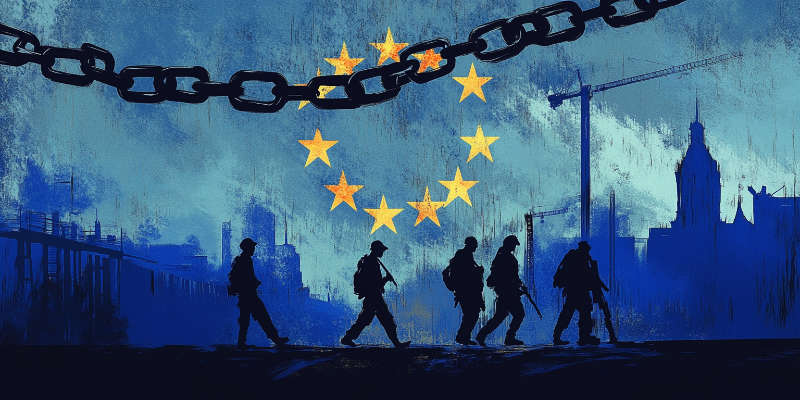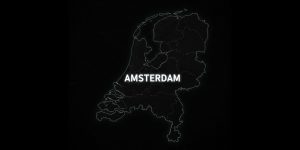The European Union: A Failure That Does Not Benefit Europeans

The European Union (EU) was sold to Europeans as a guarantor of peace, prosperity, and stability. Citizens were told that the EU would foster economic growth, protect workers’ rights, and create a harmonious political environment where all member states could thrive equally. Instead, it has become a bloated and unaccountable bureaucracy that has made life harder for ordinary Europeans. From rising inflation and energy costs to uncontrolled immigration and the erosion of democratic rights, the EU has consistently acted in ways that harm the very people it claims to serve. Its handling of crises — from the financial meltdown to the COVID-19 pandemic and the war in Ukraine — has exposed its incompetence and corruption. Far from protecting Europeans, the EU has become a threat to their economic security and political freedom.
Inflation and the cost of living crisis
The Euro and structural imbalances
The eurozone’s inflation crisis is not an accident — it is the direct result of EU policies. The European Central Bank (ECB) printed money recklessly during the COVID-19 pandemic, flooding financial markets with liquidity to prevent economic collapse. While this temporarily propped up weaker southern European economies, the long-term consequences were severe: prices for food, energy, and housing skyrocketed across the continent. Inflation rates have soared to levels not seen in decades, eroding the purchasing power of ordinary Europeans. Families now struggle to afford basic necessities, while middle-class savings are being wiped out by rising costs (Schnabl, 2023, The Economic Consequences of ECB Policies).
The EU’s insistence on maintaining the Euro — a single currency that ties together vastly different economies — has created massive imbalances, particularly hurting northern European countries whose citizens are forced to subsidize weaker economies in the south and east. Countries like Germany and the Netherlands have become net payers to the EU, funding bailouts and wealth redistribution that do little to improve economic stability. Meanwhile, wages have failed to keep up with inflation, making life increasingly unaffordable for average Europeans (Schnabl, 2023, The Economic Consequences of ECB Policies). The result is a growing divide between creditor and debtor nations, with resentment building as wealth is siphoned from productive economies to prop up inefficient and often corrupt southern European states.
Immigration and replacement migration
The social and economic consequences
EU immigration policy has been a disaster. Under the guise of “humanitarianism,” the EU has pursued policies that have flooded Europe with migrants from Africa, the Middle East, and South Asia. The so-called “replacement migration” promoted by the United Nations — and embraced by EU bureaucrats — is openly designed to offset declining birth rates by importing large numbers of migrants (United Nations, 2000, Replacement Migration: Is It a Solution to Declining and Ageing Populations?). This has created enormous social tensions, increased crime rates, and put massive pressure on welfare systems. In countries like Sweden, Germany, and France, entire neighborhoods have been transformed, with parallel societies emerging where the rule of law barely applies.
Despite public opposition to mass migration, EU leaders have doubled down, using accusations of racism and xenophobia to silence critics. Countries that have resisted EU-mandated migrant quotas, such as Hungary and Poland, have faced legal challenges and financial penalties from Brussels. Meanwhile, crime statistics in major European cities paint a grim picture: increased violent crime, sexual assaults, and social unrest have become common in areas with large migrant populations. The economic burden is immense, with healthcare, education, and housing systems struggling to cope with the added pressure.
Political and demographic manipulation
EU leaders have framed replacement migration as an “economic necessity.” European Commissioner for Home Affairs Ylva Johansson stated that “Europe needs migration to remain competitive” (European Commission, 2023, EU Immigration and Asylum Policy). This rationale ignores the social and political consequences of forcing large-scale demographic change on unwilling populations. The political motivations behind this policy are clear: migrants are more likely to support left-leaning parties that favor EU expansion and centralized control, creating a new voter base that benefits the Brussels political officials.
Moreover, this policy benefits large corporations that rely on low-cost migrant labor while driving down wages for native workers. The erosion of cultural identity and the rise of social conflict are considered acceptable collateral damage by EU politics, who see mass migration as a tool for consolidating political power and breaking down national cohesion.
Immigration’s impact on housing availability in the EU
The European housing market has been significantly impacted by immigration, as a growing influx of migrants, particularly refugees, puts additional strain on already limited housing availability. In many major cities, a high concentration of migrants seeking better opportunities leads to increased demand for housing. This, in turn, exacerbates the housing shortage, particularly in urban areas where jobs, educational opportunities, and social services are more concentrated. According to a report by the European Commission, “The impact of migration on housing in the EU” (2022), cities like Berlin, Paris, and Stockholm have experienced an upsurge in housing demand due to the influx of migrants, which further inflates rents and decreases the availability of affordable housing options. In some cases, these cities see rising levels of overcrowding, as families are forced to share smaller homes, driving up living costs for both migrants and local residents.
“Refugees” placed before EU citizens
A particularly concerning issue is the prioritization of refugees and migrants over EU citizens in the allocation of housing. Local authorities, often under pressure from EU mandates, prioritize providing shelter and assistance to refugees, leading to longer waiting times for EU citizens in need of social housing. In countries like Germany and Sweden, policies aimed at facilitating the integration of migrants have led to situations where local residents face lengthy delays in accessing affordable housing. As highlighted by the Swedish Migration Agency in their report “Sweden’s Immigration Policy and Housing Crisis” (2021), the surge in asylum seekers and the allocation of housing to these individuals have resulted in native citizens facing longer waiting periods and higher rents, as available housing is often redirected to accommodate newly arrived migrants.
This practice has led to rising tensions, as EU citizens perceive a disparity in the treatment of refugees compared to locals. Critics argue that this policy prioritizes non-EU citizens over those who have contributed to the economy and society, leading to growing discontent and social unrest. The growing gap in housing availability for locals versus migrants is an issue that continues to fuel debates about the sustainability of EU immigration policies, as well as concerns about the long-term consequences on social cohesion and economic stability (European Commission, Immigration and Housing Challenges in Europe, 2021).
Erosion of democracy
The power of unelected bureaucrats
The EU’s democratic deficit is not a flaw — it’s intentional. The European Commission, which holds executive power, is composed of unelected bureaucrats who answer only to other EU officials in Brussels. These commissioners are appointed through political deals among member states, bypassing voter accountability (Schmidt, 2020, The European Union and the Power of Bureaucracy). Major policy decisions on trade, immigration, and environmental regulations are made by individuals who have never stood for election and cannot be removed by voters.
The European Parliament, the only directly elected EU body, has limited power. It can suggest amendments but cannot draft legislation or veto Commission decisions. Even when the Parliament rejects proposals, the Commission can push them through by repackaging them or bypassing parliamentary approval altogether. The European Council, where national leaders negotiate behind closed doors, makes key decisions without public input — reinforcing the EU’s image as an elitist project disconnected from ordinary citizens (Schmidt, 2020, The European Union and the Power of Bureaucracy).
The removal of national sovereignty
EU treaties override national sovereignty, giving Brussels ultimate authority over member states. The supremacy of EU law is enforced by the European Court of Justice (ECJ), which regularly overrules national laws on immigration, trade, and labor policy (European Commission, 2021, EU Law and National Sovereignty). When Poland and Hungary tried to push back against EU influence, they faced financial penalties and threats of losing voting rights under Article 7 (Politico, 2022, Poland and Hungary’s Struggles with EU Influence).
The appointment of Ursula von der Leyen as Commission President without public input reflects the EU’s disdain for democratic legitimacy. Von der Leyen was not the lead candidate in the European Parliament elections but was installed through backroom deals between German and French leaders (Politico, 2019, Ursula von der Leyen’s Appointment). Her push for the European Green Deal and military aid to Ukraine was carried out with minimal input from national parliaments, despite the major economic and political consequences (Reuters, 2023, The European Green Deal and Military Aid).
Rising energy costs and green transition
EU sanctions and the energy crisis
Europe’s energy crisis is largely self-inflicted. The European Union’s aggressive push for renewable energy, while well-intentioned in its goals to reduce carbon emissions, has had serious unintended consequences on the continent’s energy stability. This push has dismantled reliable energy infrastructure, replacing it with an over-reliance on intermittent sources like wind and solar power. As part of the EU’s commitment to its green transition agenda, coal and nuclear plants have been shut down across member states. These energy sources, while criticized for their environmental impact, provided consistent and stable energy production. Their closure, driven by pressure from Brussels’ climate policies, has left Europe with a significant energy shortfall that renewable sources simply cannot fill (IEA, 2022, World Energy Outlook). Wind and solar power are unreliable, highly dependent on weather conditions, and cannot provide the steady output required to meet Europe’s growing energy demand.
As a result, the continent has found itself in an increasingly precarious situation, particularly during periods of high demand in the winter months. The EU’s renewable energy infrastructure, despite receiving massive investments and subsidies, still lacks the capability to fully replace the traditional energy infrastructure it has dismantled. With renewable energy accounting for a growing portion of Europe’s energy mix, the demand for back-up power from more reliable sources has surged. However, the closure of coal and nuclear plants, coupled with the EU’s commitment to decarbonizing its energy sector, means that few backup options are available to stabilize the grid. The consequences of this transition have led to soaring energy prices and a growing reliance on energy imports from countries outside of Europe (IEA, 2022, World Energy Outlook).
Dependence on hostile regimes
The EU’s hostile stance toward Russia, largely driven by pressure from NATO and the United States, has exacerbated Europe’s energy crisis. The sanctions imposed on Russian oil and gas exports in response to the war in Ukraine have had the opposite effect of what was intended, with energy prices skyrocketing as a result. Rather than weakening Russia’s economic position, the EU sanctions have led to energy shortages and significant price hikes, forcing European governments to scramble for alternative sources of energy. The sanctions have disrupted the supply of oil and natural gas, vital to the continent’s energy mix, creating a situation where European nations are forced to purchase energy from less stable and more expensive suppliers (Reuters, 2023, Sanctions on Russian Energy and the Fallout).
As European countries cut their reliance on Russian energy, they have turned to suppliers in the Middle East, Africa, and other parts of the world. These countries, however, are often politically unstable or have their own geopolitical agendas, meaning that they may not be reliable long-term suppliers of energy. The costs of energy imports from these regions are higher, often due to the geopolitical instability and logistical challenges involved. In some cases, the EU has become more reliant on suppliers who do not share its democratic values, further complicating Europe’s energy security. As a result, Europe’s energy crisis has worsened as both the supply and cost of energy have become unpredictable, ultimately leading to higher energy bills for citizens and businesses across the continent (Reuters, 2023, Sanctions on Russian Energy and the Fallout).
Restricted rights and freedoms
Free speech and online censorship
Under the pretext of combating “disinformation” and “hate speech,” the European Union has increasingly imposed sweeping censorship measures across the continent. The introduction of the Digital Services Act (DSA) has given the European Commission the power to fine or even shut down online platforms that fail to remove content deemed politically incorrect. This legislation allows the EU to define what constitutes “harmful content,” giving unprecedented authority to unelected bureaucrats to regulate speech in a way that directly infringes on individuals’ right to free expression. The implications of such regulations are profound, as they create an environment where social media companies are incentivized to over-censor in fear of financial penalties, resulting in the removal of content that may not be objectively harmful but is politically or socially controversial (European Commission, 2022, Digital Services Act).
As the EU continues to push forward with online content moderation, the boundaries of free speech are increasingly blurred. The risk is not only that genuine disinformation or hate speech is curbed but that political discourse itself is stifled. The definition of “disinformation” can be highly subjective, leaving ample room for authoritarian control over speech that challenges the political status quo. While the EU claims that these measures are aimed at protecting citizens from harmful content, they also pose a serious threat to political freedoms by fostering an environment where critical views can be easily silenced in the name of political correctness or social stability (European Commission, 2022, Digital Services Act). This shift towards a more controlled digital space reflects a broader trend of eroding civil liberties in Europe, as governments use the justification of protecting citizens from harm to impose greater control over their lives and ideas.
Pandemic authoritarianism
During the COVID-19 pandemic, the European Union supported a series of measures that violated basic human rights, particularly bodily autonomy and the freedom of movement. One of the most controversial aspects of the EU’s response was the endorsement of vaccine mandates across several member states, which compelled individuals to take medical treatments against their will. The introduction of travel restrictions, particularly the implementation of vaccine passports, further encroached on personal freedom, making it difficult for individuals to move freely within the EU without proving their compliance with government health measures. These mandates, which were often framed as essential public health measures, in reality imposed significant restrictions on personal liberties, creating a divide between those who complied with state-enforced health policies and those who did not (Freedom House, 2023, Freedom in the World).
The EU’s actions during the pandemic reflected an authoritarian shift, where individual rights were subordinated to perceived collective needs. While public health is important, the EU’s overreach in these areas raised serious concerns about the erosion of freedoms that were once considered fundamental to European societies. The push for mandatory vaccines and travel restrictions went beyond safeguarding public health — it was about controlling citizens’ behavior through coercive measures. This authoritarian trend also extended to the political realm, as government leaders used the pandemic as an excuse to justify expanding their powers in ways that would not have been tolerated under normal circumstances (Freedom House, 2023, Freedom in the World).
War on agriculture: EU policies and their impact on local farmers
The EU’s agricultural policies have increasingly marginalized small and family-owned farms in favor of larger agribusinesses. Under the guise of environmental sustainability, the EU has enacted a series of stringent regulations that disproportionately affect small-scale farmers. These regulations, which include restrictions on pesticide use, crop rotations, and farming practices, place a heavy burden on smaller operations, making it harder for them to compete with industrial farming giants. Meanwhile, large agribusinesses, which are better equipped to absorb the costs of these regulations, continue to benefit from subsidies and favorable policies (European Commission, 2023, The CAP and the Future of Agriculture in Europe).
This growing disparity has led to a concentration of land ownership, where fewer and fewer corporations control vast swathes of farmland. This trend is further exacerbated by “land grabbing,” where large corporations and investment funds purchase agricultural land, often outbidding small farmers who are unable to compete with the financial clout of these corporate buyers. As a result, local farmers are increasingly pushed off their land, unable to sustain their livelihoods or pass down their farms to the next generation. The EU’s push for green farming, while well-intentioned, has unintentionally made it harder for small farms to survive, leaving local food systems more dependent on corporate-controlled agriculture (Farming Today, 2022, Land Grabbing in Europe).
Rising food prices
One of the most immediate consequences of the EU’s agricultural policies is the sharp increase in food prices across Europe. As small farms close or are absorbed by larger corporations, the cost of food production rises. The shift toward industrial-scale farming has led to a more centralized and less efficient agricultural system, where economies of scale benefit only the largest producers. The costs of production are then passed on to consumers, resulting in higher prices for everything from basic staples like bread and milk to more specialized products like organic produce.
In addition to the direct impacts of EU regulations on farming, the drive toward “green” policies such as carbon taxes on farming inputs, stricter emissions regulations, and restrictions on traditional farming practices have all added layers of cost to food production (European Central Bank, 2023, Inflation and the European Food Crisis). These costs inevitably find their way into food prices, making them unaffordable for many ordinary Europeans, particularly those in lower-income brackets who already face significant economic strain.
Disownment of property
As the EU’s agricultural policies have favored large corporations, the ownership and control of agricultural land have become increasingly concentrated in the hands of a few powerful entities. Smaller farmers who are unable to compete with corporate buyers are forced to sell their land, which has led to widespread land grabbing by investment funds, multinational corporations, and wealthy individuals (Farming Today, 2022, Land Grabbing in Europe). This phenomenon not only undermines the right to private property but also weakens the autonomy of local farmers, who are no longer able to decide how to manage their land or produce food independently.
In addition to the financial pressures, the EU has introduced a series of regulatory measures that restrict how landowners can use their land, further diminishing the control they have over their property. Regulations that dictate land use, crop selection, and farming practices limit farmers’ ability to adapt to market conditions or innovate in response to changing demands. Farmers are no longer free to use their land as they see fit, and these restrictions make it more difficult for younger generations to enter the farming industry, as they are faced with high land prices and burdensome regulations that limit their potential for success.
A bleak outlook
Warmongering and escalation of conflicts
The EU’s involvement in warmongering, particularly with its stance on the war in Ukraine, poses a major concern. The EU’s support for military interventions, as well as its sanctions on Russia, has contributed to the escalation of tensions in Eastern Europe. The EU’s policies regarding military aid to Ukraine, without considering the long-term consequences, could lead to further instability and conflict. These actions risk pulling the EU into a broader, more dangerous conflict, with significant financial and human costs for EU citizens (Reuters, 2023, EU’s Involvement in Ukraine and Sanctions on Russia). The EU’s rhetoric and involvement in the geopolitical struggle between Russia and the West could lead to increased militarization and a greater focus on defense spending, diverting resources from essential domestic needs (Varoufakis, 2017, Adults in the Room).
Incorporating corrupt states like Ukraine
The potential expansion of the EU to include countries like Ukraine raises major concerns about the integrity and stability of the Union. Ukraine, while facing internal struggles with corruption and governance issues, is a highly unstable candidate for EU membership. Incorporating such a country could further strain the EU’s resources, destabilize the internal cohesion of the Union, and lead to political and financial mismanagement. The EU’s efforts to fast-track Ukraine’s accession, despite the country’s deep-rooted corruption, could lead to a situation where citizens’ taxes are used to prop up a regime that fails to meet the basic requirements of transparency and good governance (Politico, 2022, The EU’s Rush to Incorporate Ukraine).
Trade war with the United States
Tensions between the EU and the United States over trade policies have been escalating in recent years. The EU’s attempts to impose regulations on tech companies, its green transition policies, and its push for carbon border taxes have led to a trade war with the US. These actions could result in retaliatory tariffs on EU goods, making European exports more expensive and threatening the livelihoods of industries reliant on international trade (Reuters, 2023, EU Trade War with the United States: A Growing Concern). A prolonged trade conflict would also hurt EU consumers by driving up prices and reducing the availability of products. The EU’s stance on global trade, coupled with its internal economic problems, could exacerbate the financial strain on EU citizens, particularly those in sectors vulnerable to international market shifts (Schmidt, 2020, Global Trade and EU Policies).
The digital Euro as a tool for control
The introduction of the digital Euro represents another significant step in the EU’s ongoing efforts to control citizens’ lives, particularly their financial autonomy. Unlike cash, which allows for a degree of anonymity and personal freedom, the digital euro will allow the European Central Bank (ECB) and national governments to track and monitor every transaction made by individuals. The ability to track all financial transactions offers governments unprecedented oversight into citizens’ spending habits, saving patterns, and even political activities. This move toward a fully digital economy raises serious concerns about privacy and the potential for state surveillance. Critics argue that the digital euro is a step towards a surveillance state, where every purchase is monitored, and individuals’ financial freedom is constrained by government oversight (ECB, 2023, The Digital Euro: A New Era for Money).
Moreover, the digital euro has been described by officials as “programmable,” meaning that it could be designed to restrict or control how individuals spend their money. Authorities could impose spending limits on certain goods or services, restrict purchases based on a person’s location, or even prevent citizens from transferring funds to certain individuals or countries. This level of control over financial transactions has serious implications for personal freedom. The digital euro could effectively be used as a tool to punish individuals who engage in activities that governments deem undesirable or politically unacceptable. By enabling authorities to program money in ways that restrict freedom, the digital euro undermines the core principles of economic liberty that underpin democratic societies (ECB, 2023, The Digital Euro: A New Era for Money).
Worsening of problems brought on EU citizens by the EU
The problems created by the EU for its citizens are unlikely to improve anytime soon, and in fact, they seem destined to worsen with time. From rising inflation and growing economic inequality to housing shortages, the EU’s policies continue to fuel these crises without any signs of meaningful resolution. As each challenge compounds on the other, the lives of ordinary Europeans become increasingly difficult. With the EU’s continued focus on centralizing power, prioritizing migration over local concerns, and pursuing unsustainable economic and environmental agendas, it’s clear that the solutions proposed are insufficient or ineffective. As these problems escalate, the gap between the EU’s politicians and its citizens grows wider, with little hope of change on the horizon. Rather than easing the burdens of Europeans, the EU’s approach seems poised to deepen the struggles that many are already facing, leaving citizens to bear the weight of a future filled with escalating hardship.
Conclusion
The European Union has failed its citizens. It has created inflation, fueled social division through mass migration, and imposed a costly green transition that benefits global corporations while punishing ordinary people. It has eroded democracy, stripped away individual freedoms, and enriched a class of bureaucrats and politicians. The EU’s economic policies have forced wealth redistribution from productive economies to corrupt and inefficient member states, while its foreign policy has increased the risk of military conflict and diplomatic isolation.
For Europeans to reclaim their economic prosperity, political freedom, and national identity, the EU must be dismantled. The promise of a united and harmonious Europe has collapsed under the weight of economic mismanagement, social engineering, and political corruption. A return to national sovereignty and local accountability is the only path toward a stable and prosperous future for the people of Europe.


















